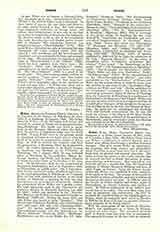

Weber, HEINRICH, German Church historian, b. at Euerdorf in the Diocese of Wurzburg, June 21, 1834; d. at Bamberg, January 18, 1898. His father, Heinrich Weber, left the Bavarian civil service and entered the employ of Prince von Leiningen-Hardenburg-Dachsburg. The family now lived at Amorbach in the Bavarian Odenwald where the father held the position of seigniorial judge until his death in 1846. Young Weber went to the primary school at Amorbach and then to the Latin school; after the death of his father he continued his studies at Wurzburg. In 1849 he entered the seminary and later the gymnasium at Bamberg, where he graduated in 1853. He studied philosophy at the Royal Lyceum at Bamberg, and theology at the University of Wurzburg. On August 9, 1857, he was ordained priest at Wurzburg by his godfather, Bishop Dr. George Anthony von Stahl, and became chaplain at Sulzbach-on-the-Main on October 11 of the same year. On February 18, 1859, he was transferred as chaplain to Sonderhofen, and on September 21, 1860, to Schweinfurt as parish priest. On September 5, 1865, he was appointed teacher of religion and history at the royal gymnasium at Wurzburg; on August 7, 1871, he was made professor of history at the royal lyceum at Bamberg, a position he held for over twenty-six years, up to the time of his death. Besides his professional duties Weber was a prolific writer. His most important work is the “Geschichte der gelehrten Schulen im Hochstift Bamberg von 1007 bis 1803”, which was published in the “Berichteuber Bestand and Wirken des historischen Vereins zu Bamberg” (1880-82). During the years 1894 and 1895 Weber also issued in these “Berichte”: “Das Bistum and Erzbistum Bamberg, seine Einteilung in alter and neuer Zeit and seine Patronatsverhaltnisse”. He further published: “Geschichte des Christenlehrunterrichts und der Katechismen im Bistum Bamberg” (Bamberg, 1883); “Bamberger Beichtbucher aus der ersten Halfte des XV. Jahrhunderts” (Kempten, 1884); “Der Kirchengesang im Furstbistum Bamberg” (Cologne, 1893), issued by the Gorres Society; “Forchheim in der Geschichte (Forchheim, 1884); “Kronach in der Geschichte” (Kronach, 1885); “Vierzehnheiligen im Frankenthal” (Bamberg, 1884); “Die St. Martinspfarrkirche in Bamberg” (Bamberg, 1891), with a necrology of the Jesuit college at Bamberg for the years 1614-1772; “Geschichte des Freiherrlich von Aufsees’schen Studienseminars in Bamberg” (Bamberg, 1880). Weber also wrote two biographies: “P. Marquard von Rotenhan S.J. 1691-1733” (Ratisbon, 1885), and “Johann Gottfried von Aschhausen, Furstbischof zu Bamberg und Wurzburg 1575-1622″ (Wurzburg, 1889). A treatise published in 1886 had for its topic the veneration of the holy “Fourteen Martyrs”. In the series of pamphlets called “Frankfurter zeitgemasse Broschuren” Weber issued: “Die `Sundenwage’ zu Wilsnack” (1887); “Die Trappistenmission in Sudafrika” (1891); “Die Kaiseridee des Mittelalters” (1892); “Bunte Bilder aus dem alten Zunftleben” (1892) `Die Klostersuppe” (1895). Weber also collaborated on the “Historisch-politische Blatter”, and other periodicals, on the “Kirchenlexikon” of Wetzer and Welte, for the second edition of which he wrote some fifty articles; he also wrote for the “Katholische Flugschriften zur Wehr and Lehr” (Berlin, published by the “Germania” newspaper). On July 8, 1889, he received an honorary degree of Doctor of Theology from the University of Wurzburg in consideration of his services as an historian of the Church. Weber was not only noted as an historical investigator but also as a model priest who gave all his energies to the promotion of religious life in the City and Diocese of Bamberg. In particular he encouraged the Catholic Press and Catholic associational life; he also did much for a house of the Sisters of the Most Divine Savior at Bamberg, a branch of the mother-house at Niederbronn, and for twenty-five years was director and confessor to the Sisters at Bamberg.
MAX HEIMBIICHER

